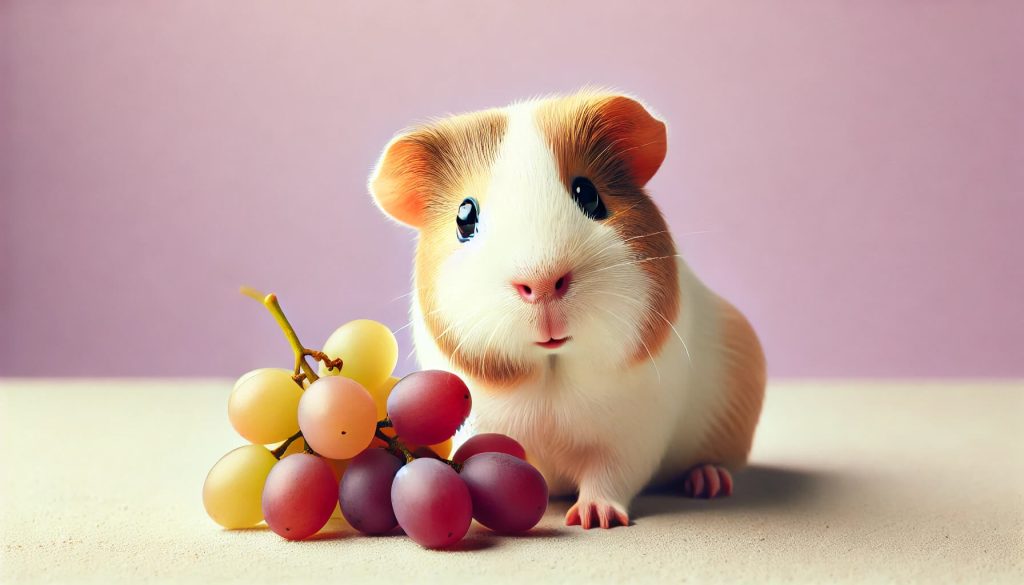
Can Guinea Pigs Eat Grapes?
Nutritional Profile of Grapes
Grapes offer various nutrients, making them a potential treat for guinea pigs. Understanding their nutritional content helps decide if grapes fit your pet’s diet.
Vitamin Content in Grapes
Grapes contain essential vitamins. Vitamin C, crucial for guinea pigs due to their inability to produce it, is present in small amounts. A 100-gram serving of grapes provides about 4 mg of Vitamin C. They also contain Vitamin K and B vitamins which can support your guinea pig’s overall health.
Sugar Content and Risks
Grapes have high sugar content. A 100-gram serving contains around 16 grams of sugar. Excessive sugar can lead to obesity and diabetes in guinea pigs. Offer grapes sparingly to avoid these health risks and maintain a balanced diet.
Health Benefits of Grapes for Guinea Pigs
Grapes offer nutritional benefits for guinea pigs when given in moderation. These benefits revolve around antioxidants and impacts on the digestive system.
Antioxidants and Their Role
Grapes contain antioxidants like flavonoids and resveratrol. These antioxidants help combat oxidative stress in guinea pigs, which can improve overall health. Flavonoids protect cells from damage, and resveratrol supports heart health. By incorporating grapes occasionally into your guinea pig’s diet, you can provide these antioxidants, enhancing their well-being.
Effects on Guinea Pig’s Digestive System
Grapes contribute fiber, which promotes healthy digestion. Fiber aids in maintaining bowel regularity, preventing constipation common in guinea pigs. However, the high sugar content in grapes may disrupt gut flora if consumed excessively. To reap digestive benefits without risks, offer grapes in small, infrequent servings. This balance ensures positive effects on your guinea pig’s digestive health.
Potential Risks and Precautions
Feeding grapes to guinea pigs involves certain risks. Understanding these risks ensures their health and safety.
Risk of Obesity and Diabetes
Grapes contain high sugar levels. Excessive sugar intake can lead to obesity and diabetes in guinea pigs. Obese guinea pigs often develop health issues like heart disease and joint problems. To minimize risks, serve grapes sparingly. Offer grapes as an occasional treat, not a regular part of their diet.
Grape Seeds and Choking Hazard
Grape seeds pose choking hazards. Guinea pigs, due to their small size and chewing habits, risk choking on seeds. Always remove seeds before feeding grapes to your pet. Seedless grapes also prevent this risk. If you notice any signs of choking, such as coughing or difficulty breathing, contact a veterinarian immediately.
Feeding Guidelines for Guinea Pigs
When giving your guinea pig grapes, it’s essential to follow specific guidelines to ensure their safety and health.
How Many Grapes to Feed
Feed grapes to guinea pigs in moderation. Offer no more than 1-2 small grape pieces once or twice a week. This quantity helps prevent negative health effects like obesity and diabetes due to the high sugar content of grapes.
Preparation and Serving Tips
Ensure grapes are thoroughly washed. Remove seeds to avoid choking hazards or opt for seedless grapes. Cut grapes into small, bite-sized pieces to make them easier for your guinea pig to eat safely. It’s also wise to introduce grapes gradually, watching for any adverse reactions or digestive issues.
Alternative Healthy Treats for Guinea Pigs
Introducing a variety of healthy treats ensures your guinea pig enjoys a balanced diet. Safe, nutritious food choices contribute to their overall health and well-being.
Safe Fruits and Vegetables
Guinea pigs can enjoy a range of fruits and vegetables that are safe and beneficial. These options should be fed in moderation to avoid any digestive issues and ensure balanced nutrition.
- Bell Peppers: Provide high Vitamin C content. Red, yellow, and green bell peppers are all safe.
- Carrots: Offer Vitamin A. Stick to small amounts due to sugar content.
- Cucumbers: Great for hydration with a low-calorie count.
- Kale: A source of calcium and Vitamin C. Feed occasionally to avoid excess calcium.
- Apples: Remove seeds and feed in small slices. Rich in Vitamin C.
- Blueberries: Packed with antioxidants. Offer a few as a treat.
- Broccoli: High in Vitamin C and fiber. Feed in small pieces to prevent gas.
Recommended Treats and Snacks
In addition to fruits and vegetables, other snack options can be safe and enjoyable for your guinea pig. These treats should complement their regular food and be given in limited quantities.
- Timothy Hay Cubes: Essential for dental health and digestion.
- Dandelion Greens: Provide vitamins but should be free from pesticides.
- Mint Leaves: Help with digestive issues and offer a different taste.
- Parsley: High in Vitamin C but should be fed sparingly due to calcium content.
- Oat Hay: Good for fiber. Offer occasionally to maintain interest.
Providing a variety of these fruits, vegetables, and snacks ensures your guinea pig remains healthy and happy. Always introduce new foods gradually and monitor for any adverse reactions.
Conclusion
Grapes can be a delightful treat for your guinea pig when offered in moderation and prepared properly. While they provide essential nutrients, their high sugar content means they shouldn’t be a staple in your pet’s diet. Diversifying their snacks with safe fruits and vegetables like bell peppers, carrots, kale, and blueberries can ensure balanced nutrition and prevent health issues.
Always introduce new foods gradually and monitor your guinea pig for any adverse reactions. By following these guidelines, you’ll contribute to your guinea pig’s overall health and well-being, making snack time both enjoyable and beneficial.
